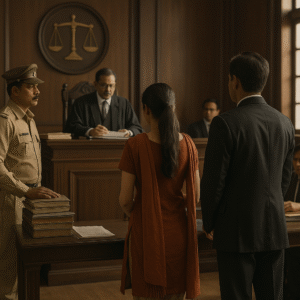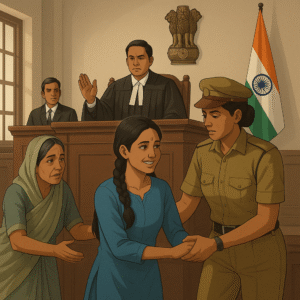The Patna High Court, through an oral judgment dated 21 May 2021, set aside major penalties imposed on a government employee of the Road Construction Department after finding that the departmental inquiry had been conducted without examining any witness and without proving the documents relied upon. The Court held that such a proceeding violated basic principles of natural justice, especially when the underlying criminal case on the same facts had ended in acquittal.
In this case, the petitioner—a departmental employee—had been punished in a disciplinary proceeding initiated on the basis of a Block Development Officer’s (BDO) report. However, no witness, including the BDO, was examined, and none of the relied documents were proved during the inquiry. The Court found this approach impermissible and underscored that mere allegations cannot substitute proof in a domestic inquiry.
The Court also noted that the petitioner had already been acquitted by a competent criminal court on the same set of facts, which further undercut the disciplinary findings. In the result, the Court allowed the writ petition with costs of ₹50,000, quashed the two punishment orders (dated 10.08.2009 and 21.06.2010), and directed the authorities to extend all consequential benefits within three months, failing which the arrears would carry interest at 9% per annum from the date of punishment till actual payment.
Significantly, the Court referred to the Supreme Court’s classic decision in Union of India v. H.C. Goel (AIR 1964 SC 364), reiterating that even in domestic/departmental inquiries, suspicion cannot replace proof and that scrupulous care must be taken to avoid punishing the innocent.
Simplified Explanation of the Judgment
This case is about fairness in departmental inquiries. The petitioner was accused of irregularities connected to distribution/handling of government relief funds and advances, and a disciplinary case was opened against him. The disciplinary authority relied primarily on a Block Development Officer’s report to frame charges. Yet, during the inquiry, no witness was called—not even the BDO—and no documents were legally proved. In simple terms, the inquiry relied on papers and accusations that were never tested through testimony or verification.
The High Court emphasized a basic rule: allegations must be proved according to law, and principles of natural justice must be followed. That means the person facing charges should have a fair chance to defend themselves, which includes the right to cross-examine witnesses and to challenge documents relied upon by the department. If no witness is examined and no document is proved, the proceeding lacks the evidentiary foundation necessary to impose serious penalties.
The Court also took into account that a criminal court had already acquitted the petitioner on the same facts. While it is true that criminal and departmental proceedings can run independently, an acquittal in a criminal case—especially one based on the same evidence—weakens the basis for maintaining departmental penalties, unless the department has separately proved its case with reliable evidence in accordance with service rules. Here, with no witnesses and no proved documents, that independent proof was missing.
To reinforce these requirements, the High Court quoted the Supreme Court in H.C. Goel. The Supreme Court had cautioned that even in internal (domestic) inquiries, suspicion cannot take the place of proof, and the rules of fairness apply with full force. In other words, administrative convenience or the desire to curb misconduct cannot justify cutting corners on evidence or procedure.
The State argued that disciplinary and criminal proceedings are distinct and can be conducted simultaneously, and that the inquiry followed departmental procedures. It referred to the initiation memo and claimed that the presenting officer was in place and a finding of guilt was returned. The Court, however, focused on the lack of witnesses and the absence of proof for documents, which are fundamental to any fair inquiry.
Having found the inquiry to be fatally deficient, the High Court quashed the punishment orders. It also directed the department to release all consequential benefits to the petitioner within three months. If the department delays, the arrears will carry 9% interest from the date the punishment was imposed until actual payment—an instruction clearly meant to deter non-compliance and to compensate the petitioner for the time-value of money lost due to the illegal penalties.
Finally, to ensure accountability, the Court imposed costs of ₹50,000 on the respondents. Such costs signal that the Court considered the disciplinary action and the manner of inquiry to be sufficiently flawed to warrant monetary consequences.
Significance or Implication of the Judgment
For government departments in Bihar (and generally across India), this decision is a reminder that disciplinary proceedings must not be treated as rubber-stamp processes. Departments must lead evidence properly: examine material witnesses (like the BDO whose report was used), prove documents, and give the charged officer a chance to cross-examine and rebut. Failure to do so can result in the High Court striking down the penalty, directing back-wages/benefits, and even awarding costs.
For employees, the judgment underscores that an acquittal in a criminal case, while not automatically decisive for service matters, is highly relevant when departmental findings rest on the same facts but lack independent, proved evidence. Where the department has cut corners, the High Court can intervene to restore fairness and direct monetary recompense with interest.
Legal Issue(s) Decided and the Court’s Decision with reasoning
- Whether a departmental punishment can stand when no witness is examined and no document is proved during the inquiry.
— No. The Court held that such an inquiry violates principles of natural justice and cannot sustain a major penalty. - Whether reliance on a Block Development Officer’s report without examining the officer is permissible.
— No. Since the BDO’s report was the basis of the charges, the BDO ought to have been examined. Failure to do so vitiated the proceeding. - Effect of a criminal acquittal on a parallel departmental proceeding.
— While the two can proceed independently, an acquittal on the same facts, combined with the department’s failure to prove its case, undermines the disciplinary penalty. - Reliefs granted by the High Court.
— Writ allowed with ₹50,000 costs; punishment orders dated 10.08.2009 (Memo 2927(E)) and 21.06.2010 (Memo 2452(E)) quashed; all benefits to be paid within three months, failing which 9% interest on arrears applies from date of punishment until payment.
Judgments Referred by Parties (with citations)
- Kumaon Mandal Vikas Nigam Ltd. v. Girja Shankar Pant & Ors., (2001) 1 SCC 182. Referred by petitioner’s counsel to argue that the major punishment was unsustainable for non-adherence to prescribed rules, particularly when the criminal case on the same facts ended in acquittal.
Judgments Relied Upon or Cited by Court (with citations)
- Union of India v. H.C. Goel, AIR 1964 SC 364 — quoted to stress that mere suspicion cannot substitute for proof even in departmental inquiries, and that scrupulous care is required to avoid punishing the innocent.
Case Title
Chhotu Prasad v. The State of Bihar & Ors.
Case Number
Civil Writ Jurisdiction Case No. 14991 of 2010.
Citation(s)
2021(2) PLJR 773
Coram and Names of Judges
Hon’ble Mr. Justice Anil Kumar Upadhyay. Judgment dated 21.05.2021.
Names of Advocates and who they appeared for
Mr. Rajeev Kumar Singh, Advocate — for the petitioner;
Mr. Dinesh Maharaj, Advocate — for the State.
Link to Judgment
MTUjMTQ5OTEjMjAxMCMxI04=-mTUxN8bebZ8=
If you found this explanation helpful and wish to stay informed about how legal developments may affect your rights in Bihar, you may consider following Samvida Law Associates for more updates.








